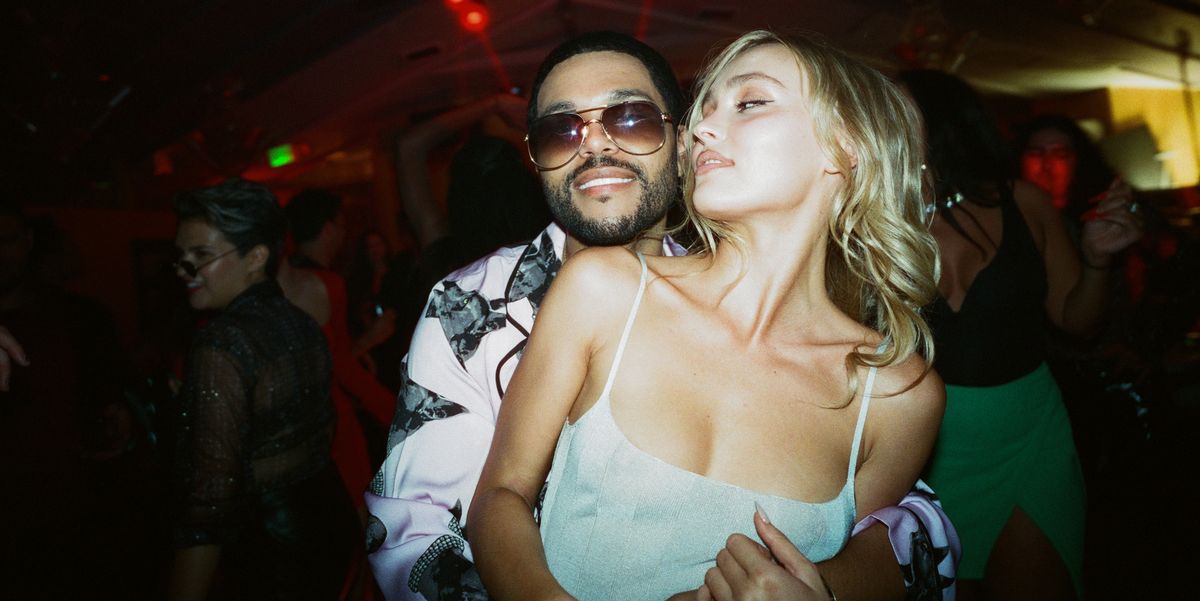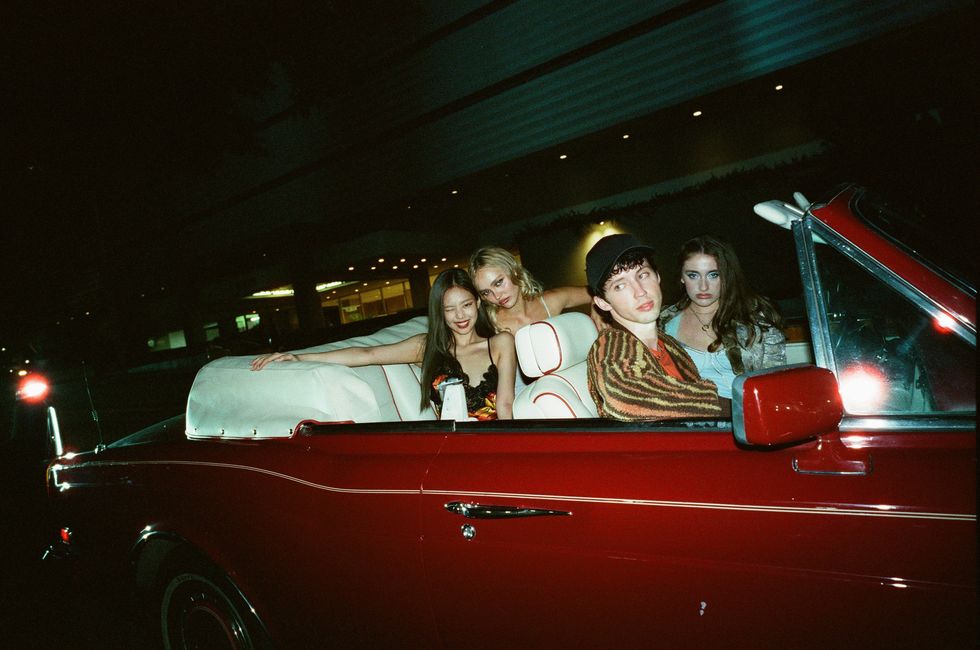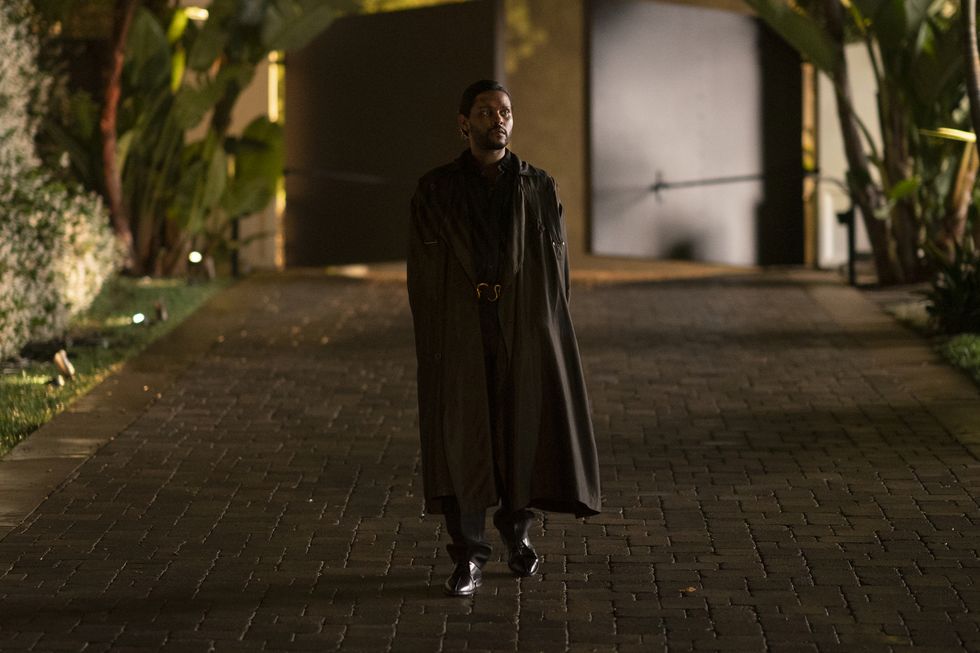Spoilers below.
The Idol is about nihilism, or consumerism, or gender power dynamics, or the ruins of culture, or sexual empowerment (but probably sexual manipulation), or maybe the price of one’s soul. Any of these explanations are equally plausible after the series’ disjointed, if intriguing, premiere episode, in which pop star Jocelyn (Lily Rose-Depp) attempts her comeback only to chain-smoke her way into the arms of Tedros (Abel “The Weeknd” Tesfaye). The rat-tailed club owner seems to think himself capable of remaking Jocelyn into a divine image, if not through reverence than with the force of near-asphyxiation. Theirs is an ugly, convoluted relationship from its inception.
The episode opens on Depp’s face as she’s asked—though “instructed” might be a better word—to contort it. “Gimme some innocence now,” the photographer orders, and Depp—to her credit as an actress—obliges with gusto. “Now mischievous. Okay, pure sex now. And now emotional.” As tears leak from her eyes, the response is a whisper. “Beautiful.” The scene seems to set up what one might assume is the thesis of the series: Look at what we do to these women. Look at what they do to themselves. Look at what we call beautiful.
But Jocelyn insists she’s in control, even as she’s surrounded with numerous signs that the opposite is true. When the photoshoot intimacy coordinator attempts to maintain the parameters of the nudity rider Jocelyn’s “people” signed, he’s treated as a “fucking annoying” anti-feminist killjoy wasting precious resources (i.e. money) for the benefit of a false sense of security. (And perhaps there’s some solid criticism hidden here—about the image-control red tape of Hollywood, focusing more on protecting a “team” than protecting Jocelyn herself. Still, I don’t buy it. That red tape exists for a reason, and The Idol’s flippant approach doesn’t cleanse the exchange of its ickiness.) Either way, Jocelyn’s manager, Chaim (Hank Azaria), locks the intimacy coordinator in a bathroom so he doesn’t have to pay “the price of safety.”
Meanwhile, the rest of Jocelyn’s posse of employees and publicists gather outside to assess the damage of her newest scandal: She’s the No. 1 trending topic on Twitter, thanks to a leaked photo of the singer posing with cum on her face. Whose?! From whence?! The team vacillates between hysteria (“She’s fuckin’ famous! She can’t do that!”) and wary respect (“Who among us has not had cum on their face?”), eager to spin the narrative into one of victimization or empowerment (which, in their mind—and perhaps the mind of the show—all too often become the same thing).
They hide Jocelyn’s phone to prevent her from experiencing another “psychotic break,” just as Vanity Fair journalist Talia Hirsch (Hari Nef)—described as “one of the great pop culture writers”—arrives to profile the star. We learn, via exposition peppered in throughout the team’s pre-interview pitch to Talia, that Jocelyn’s mother died of cancer. (“We don’t need to go deep on that, but she is prioritizing wellness,” adds a nervy Dan Levy as publicist Benjamin.) After the death, Jocelyn rescheduled her tour, but she’s back on track, releasing a new single in two weeks. Problem is, tickets aren’t selling, as Live Nation’s Andrew Finkelstein (Eli Roth) reveals to Chaim. From the balcony, Talia and the team watch Jocelyn rehearse her Britney Spears-inspired dance sequence, taking cues from her friend Dyanne (Blackpink superstar Jennie Kim). We witness Joss cry for the second time in 20 minutes.
After she learns about the photo, Joss decides to let off steam at a club while her people strategize. “Tomorrow, I wanna wake up to, like, 150 Google Alerts telling me Jocelyn’s some kind of feminist hero, right?” says Nikki (Jane Adams), manager of Jocelyn’s label. “But I’m gonna start with ‘victim’ and move up from there.”
As Madonna’s “Like A Prayer” pumps through the club speakers, Jocelyn finally encounters Tedros, who shuts down the music just to demand a dance with her. (The order of his words here fascinates me: “I gotta have a dance with you. Can I dance with you? I’m gonna dance with you.”) Jocelyn’s friend and assistant, Leia (Rachel Sennott), watches on with a queasy look as the two grind and sway. They slip away from Leia’s watchful eye to make out in the stairwell and talk about art—or, rather, what Jocelyn should be doing with her art. She feels her new single, “World Class Sinner,” is vapid because pop music (and maybe also sex?) is vapid. Tedros disagrees, pointing to Prince’s “When Doves Cry.” Jocelyn should not make music like Prince—that’s impossible—but she could attempt his approach. Great idea! Such a great idea, in fact, that Jocelyn goes home and cuts off her own air supply so she can masturbate.
Later, Talia finally gets her chance to interview Jocelyn, who doesn’t fall for any of the former’s attempts to nudge her into vulnerability (or, depending on your perspective, clickbait). It’s possible Talia’s a vulture, trying to manipulate the star for the sake of a viral story. It’s also possible she respects Jocelyn, and as such wants to know the truth. The reality is almost certainly somewhere in the middle, and that’s why Jocelyn’s response to “Who do you answer to?” is a knowing look and a blithe reply: “God.”
In the next scene, Joss and Leia lounge on the couch and watch Basic Instinct—possibly a rather unsubtle bit of foreshadowing, as the real-life Vanity Fair pointed out—while Joss bemoans her new single. To medicate her worries, she thinks she’ll invite Tedros over. Leia doesn’t like how “rape-y” he comes across, to which Joss replies, “Yeah, I kinda like that about him.” Oof. Leia’s PR alarm goes haywire. But Tedros arrives anyway, dressed in a trench coat like he’s fresh out of Batman’s rogue gallery. Joss plays mind games for a bit, making him pace and pick his teeth and practice his grumble as she primps in the upstairs bedroom. It’s a familiar first-date power move, but how much of that power is illusion? And if it’s not illusion, then what exactly is The Idol trying to say? That all this chatter about “power dynamics” is exactly what’s keeping Jocelyn from reaching her potential in the first place? So, then, what does it say that her “reaching her potential” is as much about her team’s monetary compensation as it is about her artistic fulfillment? The premise of the show is so straightforward it’s aggressive, but the actual thematic execution feels wobbly at best. Maybe that improves as the series goes on.
Anyway, Joss and Tedros are in the throes of making music by way of BDSM. In Jocelyn’s in-home studio, she plays him her single, and his review is straight to the point: He likes it, but he doesn’t believe Jocelyn’s vocals. “If you’re gonna sing a song called ‘I’m A Freak,’ you should at least sing it like you know how to fuck.” The choice of words here is intentionally sharp, as he further instructs, “You gotta stop caring what people think.” To get her to do so, he sheaths her head in blood-red fabric and chokes her, only allowing her to breathe once he’s cut a hole—with a knife—into her open mouth. The hole pulses as she gasps for air; you can be sure the sexual imagery is just as intentional as the crude force of the word “fuck.”
The whole thing reeks of abuse, which is, of course, precisely director and co-creator Sam Levinson’s point. Right? But what if Jocelyn’s in control here? Is that even possible? And if it is, what does it mean that her artistic release can arrive only when she’s in the clenched fists of a man like Tedros? I want to believe there’s something interesting about gender and power sitting at the root of this story, but I’m concerned whatever it is—if it exists—is already getting lost in the so-called “provocative” imagery. Levinson and Tesfaye liken themselves to boundary-pushers, blurring the lines so as to say something profound, but what happens when the lines get so blurry they have nothing left to articulate?
“Now you can sing,” Tedros tells Jocelyn as the premiere episode draws to a close. Not, “Now you will sing,” or “Now you should sing,” but “Now you can.” Without Tedros’ intervention, what is supposedly Jocelyn’s most “believable” form of artistry is rendered an impossibility. I’m curious to see how that will be twisted into her empowerment.
Culture Writer
Lauren Puckett-Pope is a staff culture writer at ELLE, where she primarily covers film, television and books. She was previously an associate editor at ELLE.


